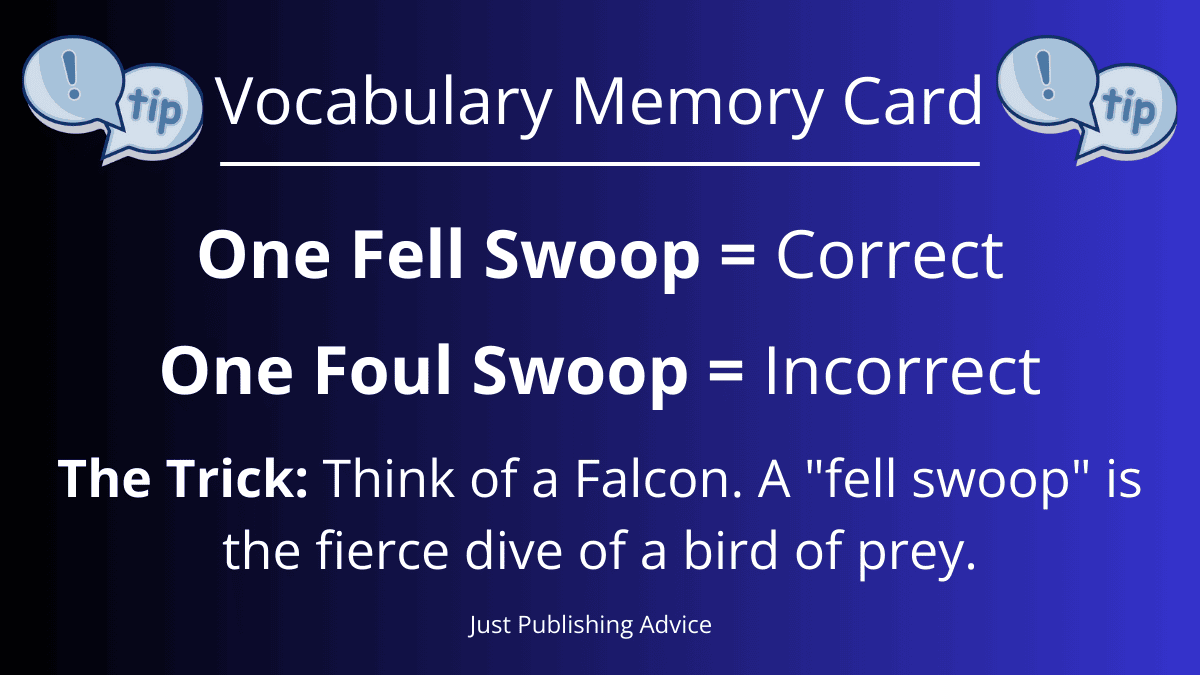
Is it one fell swoop or one foul swoop?
The correct phrase is one fell swoop.
Originally coined by Shakespeare in Macbeth, the word “fell” here is an old-fashioned term for “fierce” or “deadly.”
It describes the swift, lethal descent of a bird of prey onto its victim.
Why is fell the correct word?

Yes, fell is the past form of the verb to fall. It can also be a verb itself when referring to cutting down a tree.
Another form is as a noun for a hill or stretch of high moorland. It is mainly used in Northern England.
But there is one last definition that clarifies why fell is the correct word.
Fell is a rarely used literary adjective that means terrible evil, ferocity, or deadly.
The expression derives from a passage in Shakespeare’s Macbeth.
He has no children. All my pretty ones,
Did you say all? O hell-kite, all?
What, all my pretty chickens and their dam
At one fell swoop?
Swoop is the action of an attacking dive by a bird of prey, and fell indicates a ferocity or deadly nature of the action.
Fowl relates to birds, while foul can mean an unfair or invalid stroke or piece of play in a sport.
It might seem possible to stretch these to make a connection with swoop, but they are incorrect.
Why it is easy to get wrong
The confusion is probably because foul is a familiar word we use all the time.
It can mean unpleasant, offensive or bad, and when associated with something negative happening suddenly, it’s an easy connection to make.
Of course, another reason is that one foul swoop (or fowl swoop) rolls off the tongue much easier than one fell swoop.
It takes a bit of concentration to pronounce the expression correctly.
But if you get it wrong, you’re not alone. It’s a mistake newspapers can also make.
“I’m going to do two encores in one foul swoop,” she explains. – The Guardian
Anna Merck, her former neighbor, told the police that in May 1994 Mrs. Ricci insulted her in front of her daughter with a slur that managed to be vulgar, sexually explicit and racist in one foul swoop and then tried to run Mrs. Merck’s daughter down as she crossed the street in front of their apartment building. – The New York Times
The reality of the last week is slowly sinking in. In one foul swoop, thousands of farming families have been left high and dry with nowhere to turn. – The Daily Mail
All of the money and the power represented here, is for after the election. It’s the uber progressives. They are going to take the right out in one foul swoop. – Fox News
I also checked Google Books and found both foul swoop and fowl swoop many times.
I won’t give you quotes as examples because I don’t want to offend the authors of these books.
However, it was surprising how often incorrect variations of the expression occur in published books.
Needless to say, it’s an expression that is very easy to get wrong.
But now you know the meaning is related to a literary adjective, you’ll get it right from now on.
Rarely used words in expressions
Some fixed phrases are always candidates for making an error because they use archaic or rarely used words.
Here are some examples.
A damp squib (not squid)
A card sharp (but shark is also considered correct)
Sleight of hand (not slight)
Strait-laced (not straight)
Wrought havoc (but wreaked is also correct)
Free rein (but free reign is also common)
Have no truck (not a vehicle)
With other expressions similar to these, you really need to hit a dictionary to ensure you understand and use the correct words.
Summary
Yes, we can thank William Shakespeare for this confusing expression.
However, if you are a writer, you will come across many more fixed expressions like this one during the course of your writing.
It’s a trap that I’m always careful to avoid. But I have made plenty of mistakes over the years by thinking I know the correct form of an expression.
That’s why it always pays to check, even if you think you are using the right word in an expression.
Related Reading: On Tenterhooks Or Tender Hooks While You Are Waiting?
Share This Article


